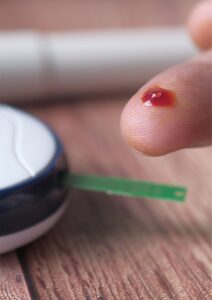In a world where 90–95% of the 37.1 million people with diabetes in the United States have type 2 diabetes, it is essential to treat this long-term disease well. Changing your diet and other parts of your life is vital to controlling type 2 diabetes, which can lead to significant health problems like heart disease, kidney disease, nerve damage, and loss of vision. But could this change in living mean having a glass of red wine with dinner? Let’s look at the evidence that drinking wine in moderation may not only be pleasurable but also a possible ally in the fight against some of the harmful effects of type 2 diabetes.
The Link Between Diabetes and Red Wine
Taking care of your food is one of the most important things you can do if you have type 2 diabetes. Since most of the glucose in our blood comes from the carbs we eat, eating the right foods can help keep blood glucose levels from rising. Most of the time, insulin helps move glucose from the bloodstream into the cells, giving them energy. Type 2 diabetes, on the other hand, makes the body resistant to insulin, which raises blood sugar and can lead to significant health problems like kidney disease, nerve damage, and heart disease.
Red and white wines don’t have as much sugar as other drinks, so diabetics may be able to drink them instead of avoiding alcohol. Since your liver puts more effort into getting rid of booze than keeping glucose levels in check, choosing low-sugar foods may help you keep your glucose levels in check.
Red wine’s benefits: getting the most out of it
Recent studies have shown that red wine may benefit your health, especially if you have type 2 diabetes. People have known for thousands of years that red wine has healing powers.
1. Supporting heart health: Heart disease and type 2 diabetes are two sides of the same coin for people with type 2 diabetes. Moderately drinking red wine can help you get more “good” HDL cholesterol, which helps eliminate “bad” cholesterol from the walls of your blood vessels. Studies have also shown a link between modest alcohol use and lower blood pressure, which is a sign of heart problems to come.
2. Reducing the risk of type 2 diabetes and its complications: A study from 2015 found that people who drank 150 mL of red wine with dinner every night for two years had a slightly lower chance of getting certain cardiometabolic diseases, such as type 2 diabetes. Regularly drinking red wine for two weeks was shown to reduce the health risks of type 2 diabetes and improve insulin resistance.
But you should talk to your doctor before adding wine to your diet since not everyone can benefit from it.
Risk Management: Red Wine and Type 2 Diabetes
Red wine is a good choice because it has less sugar than other wines, but you need to choose carefully because sweet dessert wines have a lot more sugar than red wine. A healthy meal and a glass of wine can help keep blood sugar levels stable and reduce the chance of dangerously low glucose levels.
It’s essential to monitor your glucose levels when you drink booze to ensure they stay in a healthy range. Talk to your doctor about how much wine you can safely drink and if it might mix with any of your medicines.
How to Drink Wine in Moderation
Use these tips to ensure sensible alcohol consumption:
1. Don’t drink too much wine. If you want to get the most out of wine, you should limit your daily intake to five ounces.
2. Have wine with your food. Having wine with a healthy meal can lower your chance of type 2 diabetes by 14%.
3. Choose red wine. Because it has more polyphenols than white wine, red wine seems to be better for your health.
4. Keep an eye on your blood sugar levels. The effects of alcohol on your blood sugar can last for hours, so it’s essential to keep an eye on them all the time.
Conclusion
Research suggests that drinking red wine in moderation may help control type 2 diabetes and offer benefits like better glucose levels and heart health. But it’s essential to weigh these possible benefits against the risks and talk about any changes with your doctor. Managing type 2 diabetes is different for each person, so no one treatment works for everyone. So raise a glass to your health, but only after carefully discussing the pros and cons with your doctor.









